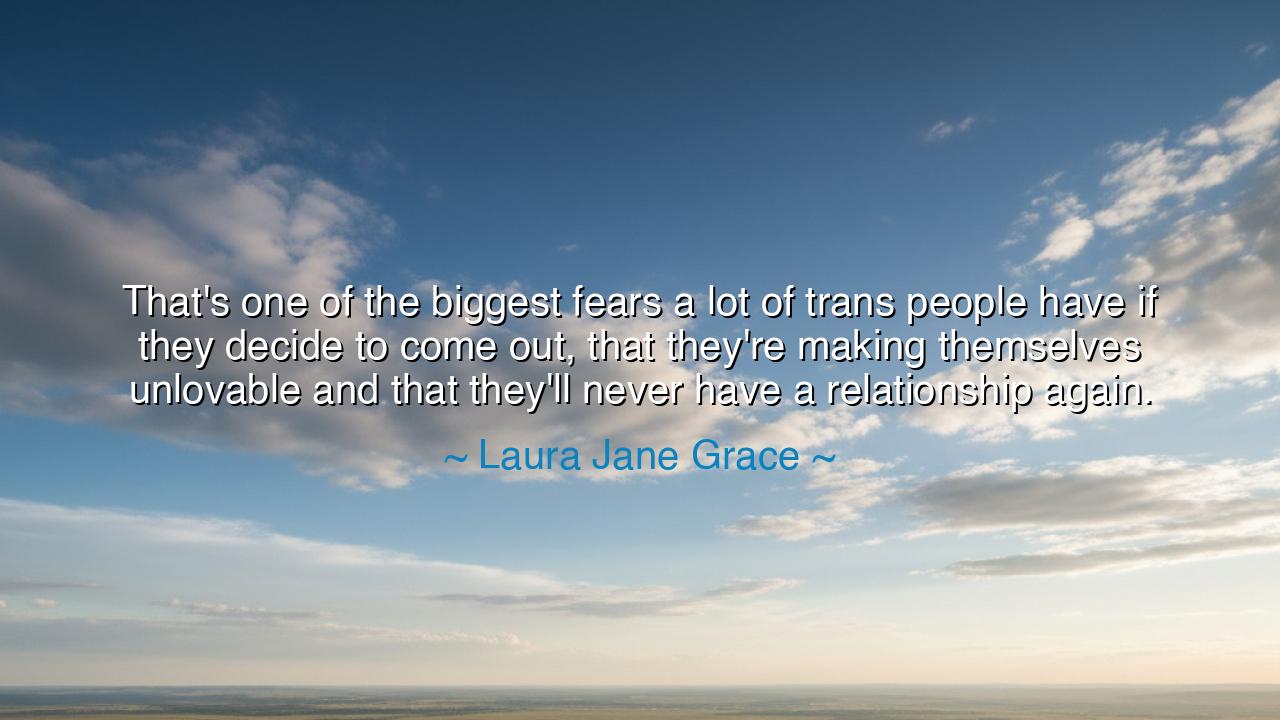
That's one of the biggest fears a lot of trans people have if
That's one of the biggest fears a lot of trans people have if they decide to come out, that they're making themselves unlovable and that they'll never have a relationship again.






The words of Laura Jane Grace, “That’s one of the biggest fears a lot of trans people have if they decide to come out, that they’re making themselves unlovable and that they’ll never have a relationship again,” echo with the voice of deep human struggle. She names aloud a sorrow that dwells in many hearts: the dread that truth, once revealed, will lead not to freedom, but to exile from love.
The fear she speaks of is not born from weakness, but from the harshness of the world, which too often punishes those who walk the path of authenticity. To come out is to step into light, to cast aside the burden of concealment, yet it carries the risk of rejection by those who cannot yet see with compassion. This is why the act requires courage greater than battle, for it places the most tender self before the gaze of others.
To feel unlovable is to believe that one’s true being cannot be embraced. This is the cruelest of illusions, for love is the birthright of every soul. Yet prejudice and misunderstanding weave chains that bind hearts in loneliness, whispering that truth severs the bonds of relationship. Grace names this lie, so that by naming, others may rise against it.
Thus, her words endure as a teaching: that the journey toward authenticity is fraught with peril, yet it is also the only path to wholeness. Future generations must remember — no identity makes one unworthy of love, no truth renders one beyond the reach of kinship. To embrace the self is not to lose relationship, but to lay the foundation for bonds that are real, enduring, and pure.






AT39. Pham Gia An Thu
It’s heartbreaking to think that so many trans people feel this way. The fear that being open about your true identity could ruin your chances of love and relationships seems like such a profound burden. Is this fear a result of the stigma and ignorance that still surrounds the trans community? What can we do to break down these barriers and show that love is about acceptance and understanding, not conformity?
THDo Thi Thu Ha
Laura Jane Grace’s quote makes me reflect on how important it is for society to move beyond traditional ideas of love and relationships. The idea that someone might feel unlovable just for being their authentic self is a sad reflection of our societal norms. Can we change the narrative to make sure everyone feels seen and loved, no matter their gender identity? How do we begin to reshape these deep-rooted fears?
DMGia Dinh Milk
It’s painful to think that trans people might fear being unlovable after coming out. I wonder, does this fear ever go away, or is it a continuous battle for acceptance? The idea that someone could be rejected for simply being themselves is devastating. What can we do as individuals and communities to make sure that everyone feels worthy of love and connection, no matter their identity?
LNLan Nguyen
I can’t imagine how difficult it must be for someone to fear that coming out could close the door to future relationships. It’s a stark reminder of how important acceptance is. But are we, as a society, doing enough to create environments where people can be themselves without this fear of rejection? What role do we play in either perpetuating or dismantling these fears, and how can we make love and acceptance unconditional?
Ddmyha
This quote hits deeply because it touches on the vulnerability that many people experience when coming out. The fear of not being accepted or loved is such a real struggle. But is this fear more about society's view of trans people, or is it rooted in internalized feelings of unworthiness? Can we truly separate someone’s identity from their capacity to be loved? This is something that needs more open conversation and understanding.